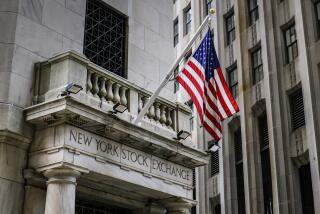China Ups Loan Rates to Slow Economy
- Share via
BEIJING — Seeking to cool its runaway economy, China unexpectedly raised its bank lending rates Thursday, sending ripples through global markets that have become increasingly dependent on the Asian nation’s growth.
Beijing’s move to lift rates for the first time in 18 months pressured commodity prices amid traders’ fears that demand from China would soften. The Middle Kingdom’s voracious appetite for resources to support its rapid development has been a boon for producers, from copper miners in Chile to cotton farmers in California.
The convulsions in commodities markets Thursday demonstrated China’s economic power. The price of crude oil, which has climbed 38% in the last 12 months, dropped 1%, closing at $70.97 a barrel. Copper dropped 3%, and zinc tumbled as much as 7%. Mining stocks across the globe slid.
“There is the risk the investment boom in China turns to bust, and that would have a knock-on effect on the rest of the world,” Julian Jessop, chief international economist with Capital Economics Ltd. in London, told Bloomberg News. “Higher rates may take off some of the froth from commodities markets.”
Hefty bank lending has contributed to China’s huge trade surplus, raising the ire of American politicians and heightening concerns in Beijing that the economy is growing too fast for its own good. China’s gross domestic product, the broadest measure of economic output, expanded at an annualized rate of 10.2% in the first quarter from a year earlier, the fastest pace among major economies.
The exceptional growth of China’s economy, the fourth-largest in the world, has spurred fears of a hard landing. Analysts and policymakers fret that unbridled investment in factories and real estate would lead to asset bubbles that if burst could spill beyond China’s borders.
Some analysts and businesspeople said Thursday’s 0.27 percentage point increase in the benchmark one-year loan rate, to 5.85%, was too small to affect spending on land, buildings and other fixed assets. They expect no immediate change in the flow of Chinese exports.
“It’s like taking a hair out of nine cows,” said Ye Huide, president of the Shanghai Taiwan Investors Assn., citing a traditional Chinese expression.
Other observers viewed Beijing’s move as significant, saying it signaled further interest rate hikes and other steps to raise the quality of bank loans and achieve a slower, more sustainable growth rate.
“This will have a big psychological impact on the market,” said Stephen Green, senior economist at Standard Chartered Bank in Shanghai. He said companies would think twice about borrowing for capital expenditures.
In Washington, Treasury Department spokesman Tony Fratto described China’s action as positive because it was making further use of market instruments to deal with its economy. This month, China said it would allow companies and individuals to invest overseas, a change that analysts called a step toward a market-based currency.
The latest move was limited because of China’s exchange rate policy, Fratto said. U.S. officials have been stepping up pressure on Beijing to allow greater flexibility in its currency, arguing that China’s fixed-rate management of the yuan has kept it artificially undervalued, giving Chinese exporters an unfair advantage.
Analysts seemed divided on whether the rate hike was a harbinger of another revaluation. Beijing appreciated the yuan by 2.1% in July but has allowed it to rise only 1.2% in value since then.
China’s central bank last increased interest rates in October 2004, also by 0.27 percentage point. But the economy felt no chill after the move.
This time, policymakers left the benchmark interest rate on deposits unchanged at 2.25%. Some analysts said that was partly aimed at boosting profitability for China’s debt-laden banks. Others said Beijing wanted to prevent further cash inflows from foreign speculators betting on a higher yuan.
China’s economic stewards have struggled with the excess cash coming in from speculators as well as dollars generated by China’s widening trade surplus with the rest of the world. The central bank buys up dollars with the yuan, leaving large sums of the Chinese currency in the banking system available for at-times questionable loans. Many businesses also have tapped informal financing channels to fund investments.
Some analysts expect Beijing to further discourage lending by requiring banks to set aside a higher ratio of their deposits, drawing down liquidity.
Chinese officials could also resort to employing command-and-control tactics as in the past, such as ordering banks to limit lending in certain areas. Regulators have already imposed investment controls on the metals, cement and other industries.
*
Lee reported from Urumqi, China, and Magnier from Beijing.
More to Read
Inside the business of entertainment
The Wide Shot brings you news, analysis and insights on everything from streaming wars to production — and what it all means for the future.
You may occasionally receive promotional content from the Los Angeles Times.











